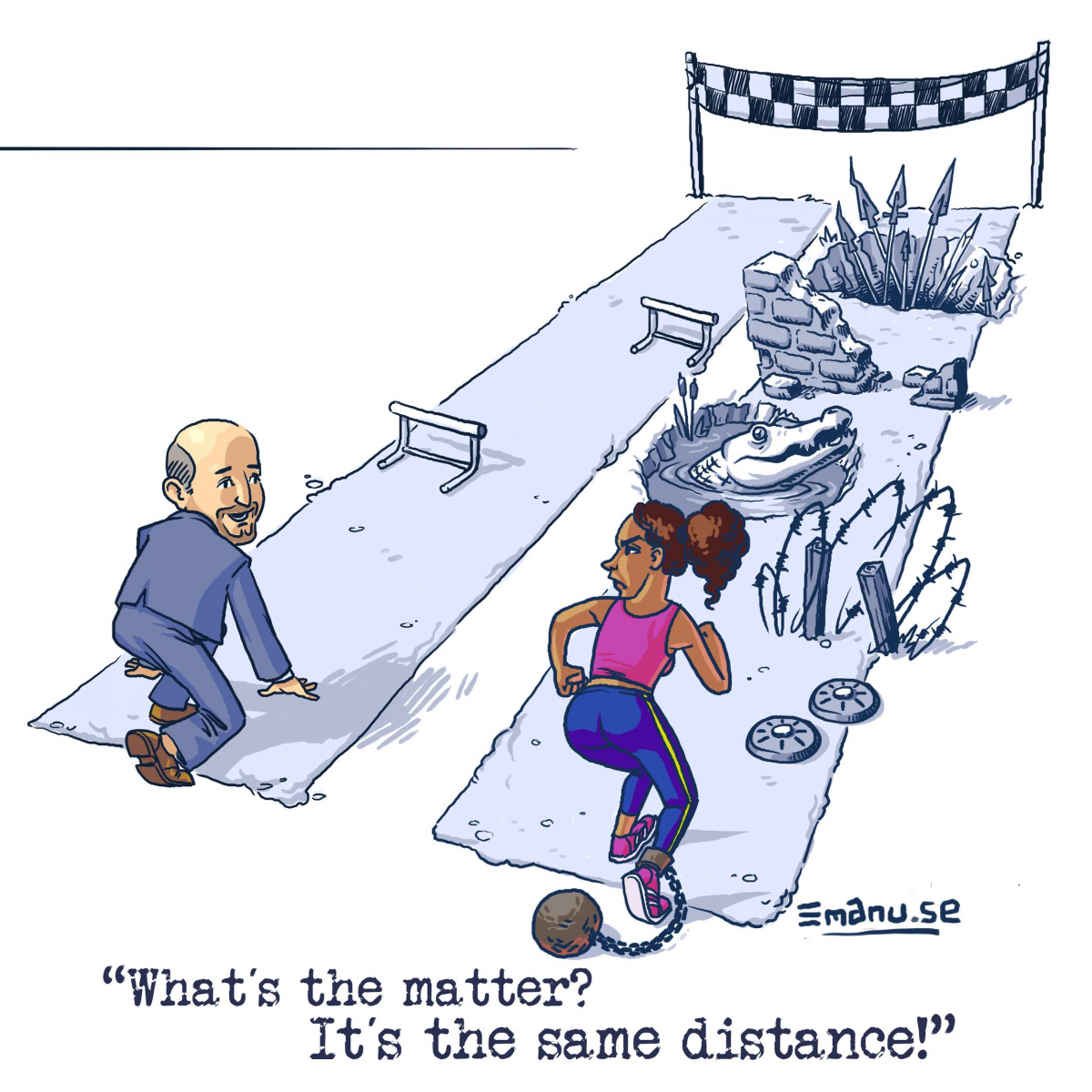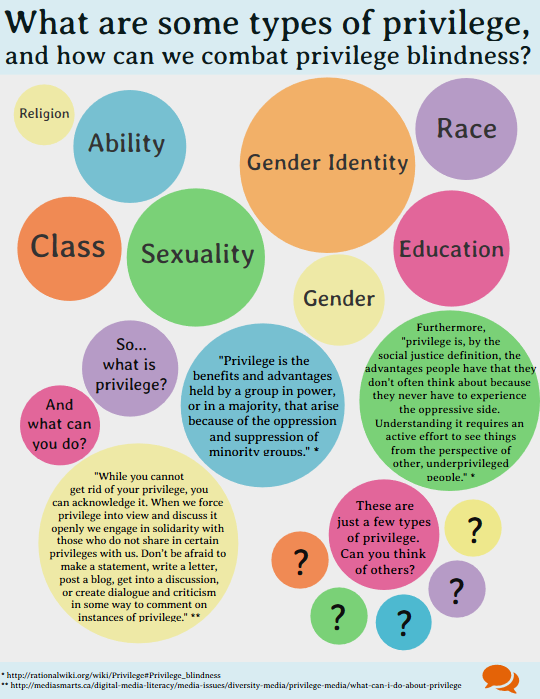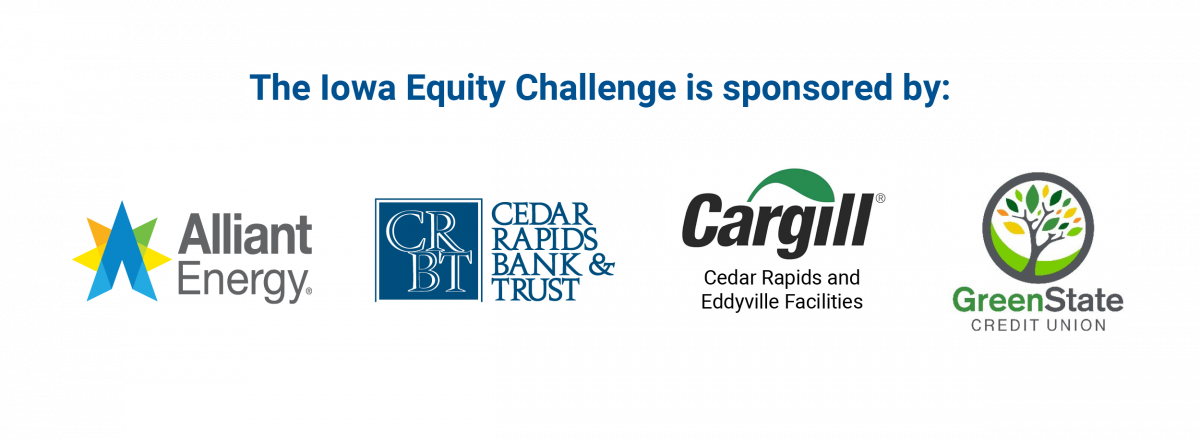
Image Source: Tompkins County Structural Racism
Illustration by Emanu
Privilege is defined as the unearned social, political, economic, and psychological benefits of membership in a group with institutional and structural power.
We commonly hear about privilege based on race or gender, but privilege can also encompass religion, sexuality, ability, class, and education. It is important to remember that aspects of an individual’s identity, as well as various forms of inequality, often operate and conflict with each other.
Recognizing the different forms of privilege we each have is the first step toward achieving social equity. You don’t have to renounce your privilege; you can use it to advocate on behalf of those who have had their voices stifled or who don’t have the same opportunities or resources as you do.

Image Source: Rider University
Learning Objectives
- Define the concept of privilege.
- Explore different types of privilege and social identities.
- Identify your personal forms of privilege and the ways you benefit from them.
Today's Activities
Choose one or more of these daily activities to learn about today’s topic. Plan to set aside 15 to 30 minutes to complete the activities and journal about your thoughts and feelings.

Read “Another Way of Looking at Social Privilege” (4 min) from Mental Health @ Home, which reframes conversations about privilege in terms of what different individuals are exposed to.

Watch “Why Does Privilege Make People So Angry” (4:51) from MTV’s “Decoded” series about why bringing attention to someone's privilege shouldn't be considered a personal attack and why discussing privilege isn't about placing blame but raising awareness.

Listen to “Unfiltered: Privilege in a Pandemic” (9:07), a podcast episode about the privileges that helped a high school student get through the pandemic and quarantine.

Explore your privilege and identities by participating in one or both of the activities below. Learn about how identities intersect, interact, and affect our perspectives, experiences, and access to power and privilege.
- Check(list) Your Privilege with this eye-opening self-assessment from BuzzFeed and discover where you are on the privilege spectrum.
- Complete this Privilege Wheel worksheet from Americans for the Arts and reflect on how demographic characteristics (or social identities) are linked with privilege.

Capture what you learned by writing down your thoughts and feelings about today's content.
-
What was your “aha moment” (moment of surprise or new information)?
-
Does this information change your perspective?
-
How will you use what you learned today to create more equitable spaces?
-
What privilege(s) do you enjoy that some of your peers do not?
-
In what ways can you use your privilege to drive change and advocate for others?
Download a free journal page for today.
Additional Resources & Activities
If you would like to dig deeper into this issue, check out these additional resources. We encourage you to revisit this material when you have more time. Feel free to come back to this topic as often as you’d like!
- Explore research guides developed by Rider University to explore the multiple ways that privilege and oppression manifest in our various social, cultural, economic, and bodily identities and situations. Use the menu on the left side of the page to learn about different types of privilege.
- Check out the book “Undoing Privilege: Unearned Advantage in a Divided World” (240 pages) by Bob Pease, which explores the main types of privilege and explains how members of privileged groups can engage critically with their own dominant position.
- Read “It’s Time to Face Our Own Privilege” (3 min) from The Gazette guest correspondent and University of Iowa professor Jamie Priest, who highlights the privilege that exists in white, cisgender, heterosexual relationships.
- Read “Different Types of Privilege, Including White Privilege - Explained” (9 min) from Well + Good to delve into 18 different types of privilege and how they impact our daily lives.
- Read “How To Talk About Privilege To Someone Who Doesn’t Know What That Is” (9 min) from Everyday Feminism, which includes six helpful tips to talk about privilege.
- Read “White Privilege: Unpacking the Invisible Knapsack” (12 min) from the National SEED Project. The article is written by activist and scholar Peggy McIntosh, who first coined the term “white privilege” in the 1980s.
- Read “What Privilege Really Means (And Doesn’t Mean)” (19 min) from Everyday Feminism about the complexities of privilege and common misconceptions.
- Watch “What Is Privilege?” (3:59) from As/Is to see a group of co-workers participating in a privilege walk and how privilege shows up in their lives in various ways.
- Watch “Privilege Explained” (8:15) by Jay Shetty, which looks at privilege from different perspectives — someone who is impacted, someone who has resources, and someone who wants to learn how to help.
- Watch “Deconstructing White Privilege with Dr. Robin DiAngelo” (20:01) from the Vital Conversations video series. DiAngelo explains the concept of “white fragility” and how a minimum amount of racial stress can become intolerable and eventually trigger rage and defensive actions.
- Watch “Black Like Us” (21:00), Season 5, Episode 10 of “black-ish,” to see the Johnson family tackle light-skinned privilege.
- Listen to “The Invisibility of White Privilege” (24:49) from the Speaking of Psychology podcast about the factors that drive many white Americans to ignore and even deny that white privilege exists.
- Listen to “How Those With Power and Privilege Can Help Others Advance” (40:28) from the HBR IdeaCast podcast about using your privilege to be a better ally in the workplace.
- Listen to music that expresses emotions and experiences tied to privilege, power, and opportunity.
- “Fast Car” (4:26) by Tracy Chapman, who sings a gritty, heartbreaking tale of yearning to escape poverty and its barriers to opportunity.
- “Black Like Me” (3:30) by Mickey Guyton, who sings about her life growing up in Arlington, Texas, the sixth most conservative city in the United States.
- “Sweet Life” (4:22) by Frank Ocean, who criticizes the sheltered lifestyle of residents in his privileged LA neighborhood following his move from New Orleans after Hurricane Katrina.
Share your reflections on today’s topic on social media using the hashtag #IowaEquityChallenge.
Next Topic: Systemic Racism
Did you miss a day? You can find the content for each daily topic on the United Ways of Iowa website. Future topics will be published on the day the email is sent.

